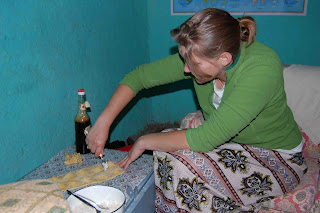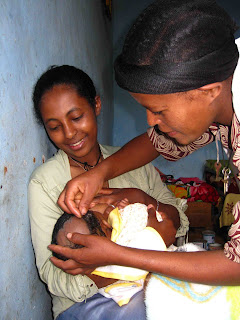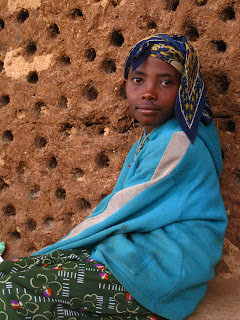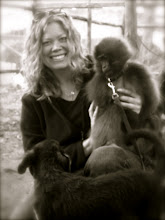Hapti, my faithful friend whose dorm is an arm’s reach from my window, has graduated high school!!! It is quite an accomplishment and I’m so proud of him. I thought I’d take an opportunity in this post to explain a little bit about how the Ethiopian educational system works and the road that Hapti has had to take to achieve this goal.
Hapti grew up in the countryside outside of town and was able to attend grades 1-6 in a rural school near his parents’ home. In order to attend grades 7 and 8 he had to move to his aunt’s home, a 4-hour walk from his parents and still an hour walk to the school. At the end of grade 8, a national examination is administered and for those students with a passing score, they are allowed to enter 9th grade. For those students who do not have a passing score, formal education ends. Hapti, fortunately, passed and continued to live with his aunt for grades 9 and 10.
At the end of grade 10 another exam is held to weed out those students who will enter preparatory school (grades 11 and 12) from those who will be invited to attend a technical training program. Hapti, again, passed. Our town, however, has only one preparatory school and this required Hapti to move once again. Due to the fact that none of Hapti’s family members lived in town, he found a room to rent and every 10 days or so, Hapti’s mom would walk in from the rural area bringing dried injera, colo (a snack made of roasted barley and peanuts), and a small amount of money for additional food.
At the end of grade 12 another national examination is held which is used to differentiate those students who will be selected for university (the higher scores) from those that will be admitted to colleges of teacher training. It is also at this time that each student completes a form that ranks their choice of university and choice of program. For Hapti, the summer passed by slowly, fraught with an equal mix of anxiety and eager anticipation. At the end of August he finally received his test score and then in late September via radio he learned of his placement. The Ethiopian education system does not afford a lot of choice and for Hapti his disappointment was great. He was placed at a new university near the Sudanese border and in a program that he has little to no interest in. And now he waits again. As with almost all of the new universities in Ethiopia, construction has not yet been completed and there isn’t sufficient room to accommodate first year students. Currently Hapti bides his time working at a café for 50 cents a day while wondering if he can handle one more move, one more sacrifice.
The road to opportunity and advancement in Ethiopia is a long and arduous one. Although education is available to all, not every family can afford or is willing to make the costly sacrifices. Hapti’s story is not unique, but rather that shared by the vast majority. It is at times like this when I feel so blessed to grow up where I did. Where freedom of choice is a given and such sacrifices are the exception rather than the rule.

Hapti proudly sporting some of the graduation gifts that he received from my parents and me. He was so appreciative to have a backpack filled with school supplies and a few “new to him” clothes. In fact, after he opened his gifts he immediately set out for the market to see if he could find someone from his rural area that would be able to get a message to his parents and in the process ran into his mom.





















































